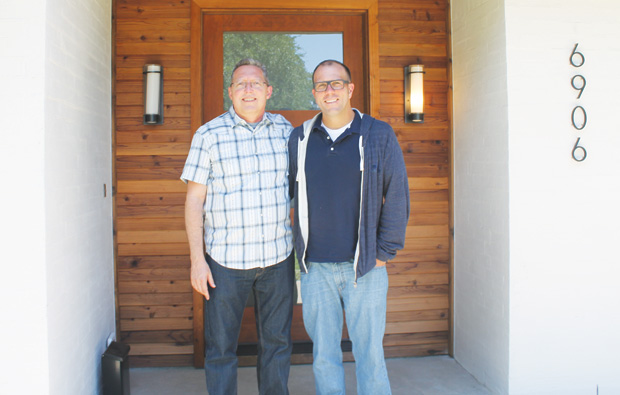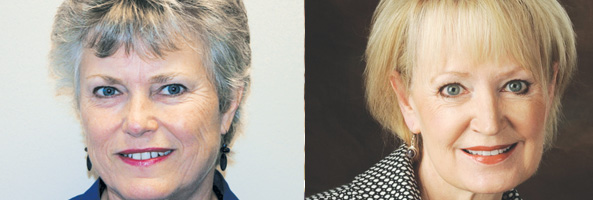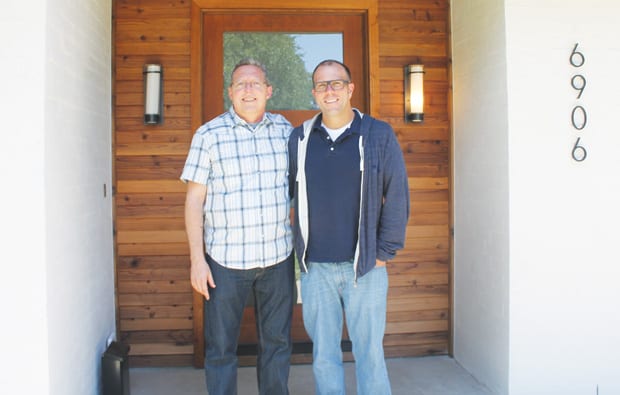Dallas couple’s case illustrates confusion created by high court’s marriage rulings

STATE OF DISARRAY | Don Chapo, left, and Chris Chapo were married in California in 2008 during the six-month window before Proposition 8 passed. They later moved to Dallas, but now Chris plans to move back to California while Don stays behind temporarily. (David Taffet/Dallas Voice)
When Chris Chapo moves to California in August, he’ll still be married to his husband, Don Chapo. But Don, who plans to remain in Dallas for the time being, won’t technically be married to Chris.
That’s because California will recognize Chris’ marriage to Don, but Texas will not recognize Don’s marriage to Chris. And there’s no telling how the federal government will view the couple.
Chris and Don Chapo have been together 13 years and were married in California in 2008 during the six-month window before Proposition 8 passed — halting same-sex marriages in the state.
After four years of state-recognized marriage in California, they moved to Dallas where they are legally single. But when Chris moves back to California to start a new job, his marriage will be recognized. Don will remain in Dallas for a few months to sell the house and his half of the marriage won’t be acknowledged.
Once Don sells the house, Chris will have to fly back to sign the papers or execute powers-of-attorney. None of that would be necessary if Texas recognized their marriage because one spouse could sign for the other on those documents.
Don wonders if Texas even recognizes his name change.
Because all of their legal papers are in place, Don knows that if anything happens to his husband in California, the hospital would contact him. But he’s worried a
Texas hospital wouldn’t call Chris if something happened here, despite listing his husband as next-of-kin.
After more than four years of marriage, the couple noticed the difference when they moved to Dallas.
“It’s very messy when you try to buy a house,” Don said.
In California, their house was community property.
“Here, we created a trust and a will,” he said. “We were legal strangers.”
Before buying their house in Lakewood, they contacted Dallas attorney Rebecca Covell. She made sure they had the necessary paperwork to make their relationship safe and secure. That involved wills and a trust, as well as powers of attorney and guardianships — everything they automatically had with a simple marriage license in California.
Don said heterosexual couples get those protections in exchange for the $50 license fee.
“And we already paid our 50 bucks,” he said.
Covell has been producing these documents for same-sex couples for 25 years. Since the U.S. Supreme Court’s historic ruling striking down a section of the Defense of
Marriage Act, she said, her office has never been busier. Her phone has been ringing off the hook from many of those couples she’s helped over the years wanting to know what they need to do now.
The biggest question from many of those couples is whether they should go to another state to marry and whether it matters where they marry.
Covell said it does make a difference. California, for example, is a community property state, while New York is not. And every state has a residency requirement for divorce, but the length of time couples are required to live in a state before divorcing varies. Iowa and New York require couples to live there for a year before divorcing, while California and Vermont only require six months of residency.
Over the years, Covell has done a number of legal name changes for clients. That involves filing legal papers and appearing in court. It’s a process that can take months.

SORTING IT ALL OUT | Attorney Rebecca Covell, left, said her practice has never been busier than in the weeks since the Supreme Court’s marriage rulings. Financial advisor Carol Meyer said while there’s still some uncertainty, same-sex couples should benefit from the DOMA ruling — even in Texas.
With a marriage license, a name change is a no-cost, automatic procedure. While Texas won’t recognize the license as legal for purposes of name changes, the state will recognize federal documents, Covell said.
After a same-sex couple marries in a state where it’s legal, Covell said the spouse who wants to change names should amend federal documents, such as a passport and a social security card. Texas would accept those as identification to amend a driver’s license or a voter registration, she said.
While many like to think marriage is about love, the DOMA case proved that the license issued is mostly about financial benefits.
Carol Meyer with Merrill Lynch Global Wealth Management said there’s still a great deal of uncertainty, but same-sex couples should benefit from the DOMA ruling — even in Texas.
If there’s a disparity in income, same-sex couples who begin filing jointly will save on their income taxes. The Chapos said they will benefit from this and plan to refigure their taxes for the previous three years.
The IRS has not ruled on whether all married same-sex couples or only married couples living in marriage-equality states may file jointly.
Spouses can take advantage of gift tax law as well. Gift tax law sets annual and lifetime limits on the amount of money someone can give to or receive from another person without paying taxes. But between spouses, the amount is unlimited.
Annuities left to spouses continue uninterrupted and with the same benefits. Currently, same-sex couples are treated as beneficiaries inheriting the asset.
No taxes accrue from an IRA or 401K left to a spouse that gay and lesbian couples were paying inheritance tax on previously. Covell said that if it was discriminatory for a gay couple to pay inheritance tax when a straight couple doesn’t, the basis of the DOMA ruling, it’s discriminatory for a gay couple to pay tax on health benefits when a straight couple doesn’t.
“Taxes will not be due on DP benefits,” Meyer agreed.
Because Don was self-employed in California, he got his health insurance through Chris’ company. That coverage was taxed as income. Over the years he received DP benefits that amounted to an extra $50,000 in taxable income. A heterosexual couple wouldn’t pay taxes on that benefit.
“Things will hopefully become more simplified” as the IRS and other agencies issue guidance, Meyer said.
For the Chapos, their changing marital status isn’t just about money. It’s about security and peace of mind.
Although they have a valid California marriage, they feel their legal status is more secure after the Supreme Court’s Prop 8 decision, which reinstated same-sex marriage in the Golden State.
When marriages were halted, Don said he suffered from a form of survivor’s guilt. While his marriage remained valid, many more people wanted to get married since then.
“We were part of a privileged class,” he said. “And that was wrong.”
After Prop 8 passed, he said, many forms in the state changed, and he was forced to call his husband a domestic partner, even though they remained married.
Overseas travel will become more comfortable for the couple as a result of the DOMA ruling.
“We don’t tend to travel all that much, but when we do, it’s a big, international trip,” Don said.
Whenever they returned to the U.S., they were required to fill out separate customs cards, even though they are legally married.
Don called that humiliating for a married couple. But more than that, it’s requires time-consuming and careful packing before returning. Because they were required to go through the immigration line separately, they packed separately, dividing purchases and receipts to avoid paying duty.
A married couple simply packs together, presents one combined customs form and may bring in one combined total.
After the DOMA ruling, married same-sex couples should be treated the same as opposite-sex couples for customs purposes since immigration law recognizes place of celebration rather than state of residence when it comes to marriages.
Covell said while the DOMA ruling makes things easier for many married couples, in the Chapos’ case, things may be more confusing than ever. Other couples will either get certain rights — or not — based on where they live.
For the Chapos, Chris may get certain rights that his husband won’t. And Covell thinks that’s a situation the Supreme Court will eventually have to settle.
This article appeared in the Dallas Voice print edition July 26, 2013.


